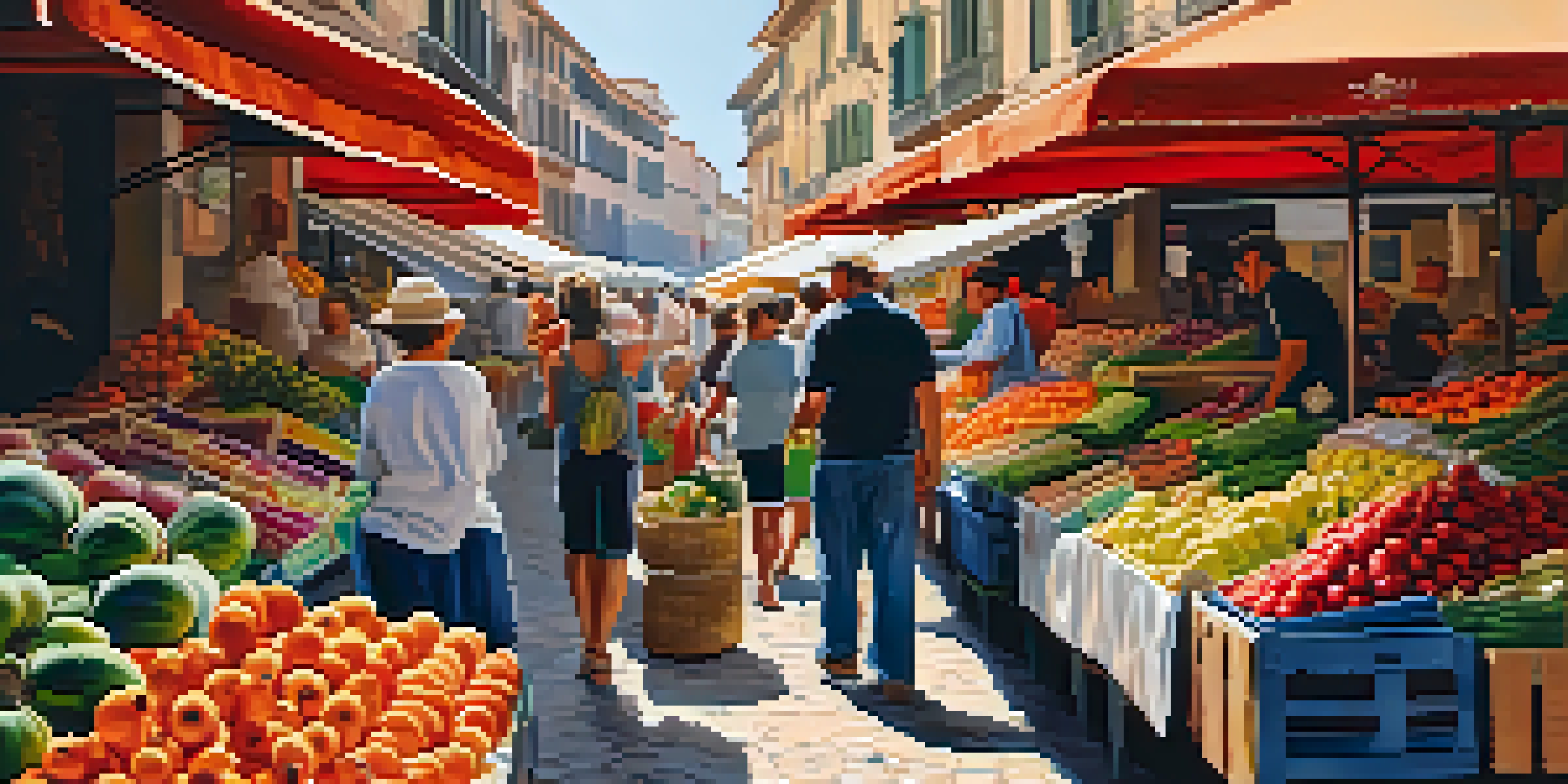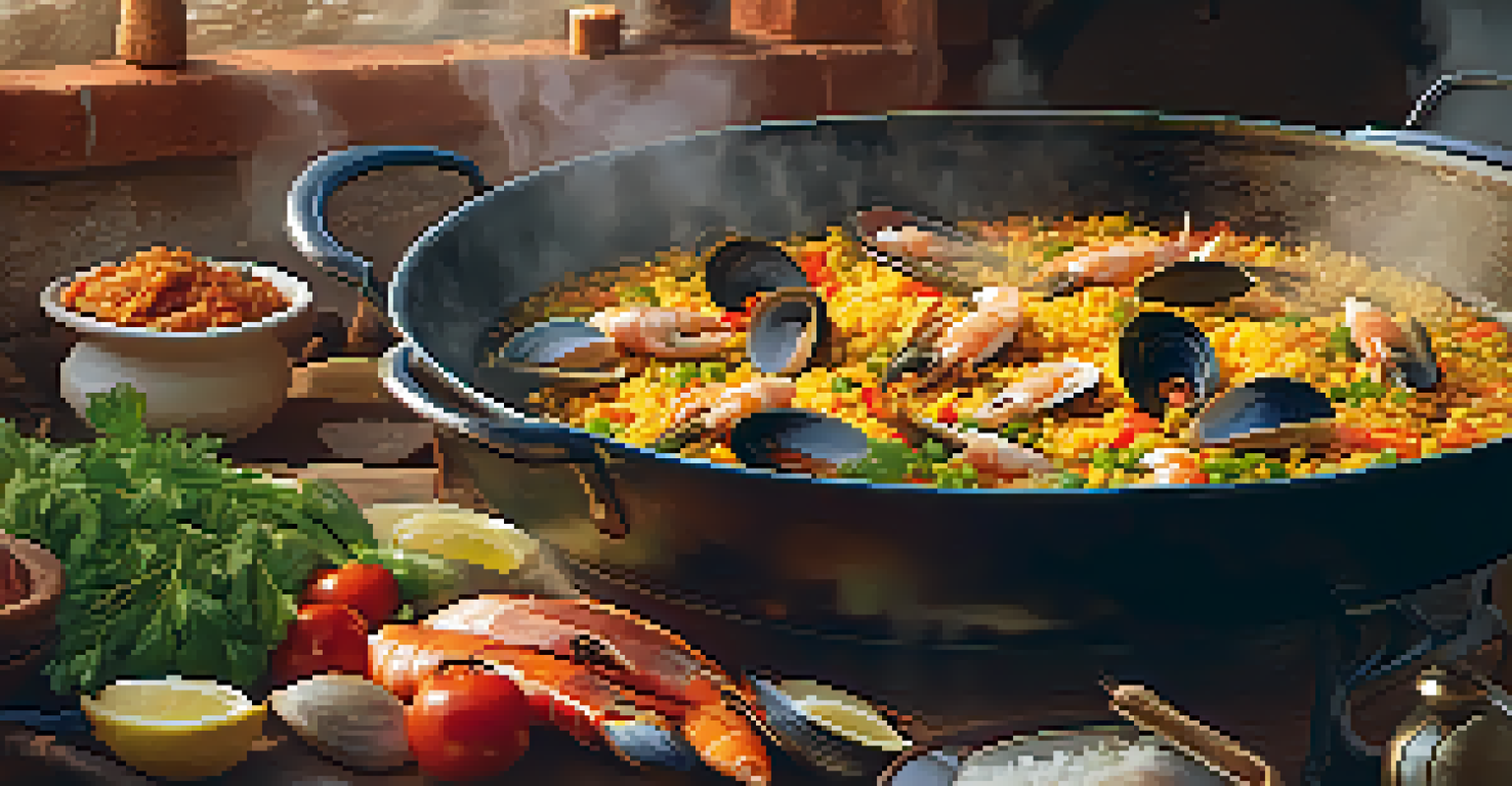Local Food and Sustainable Travel: A Taste of Spain's Culture

The Essence of Local Cuisine in Spain
Spain's local cuisine is a vibrant tapestry woven with regional flavors and traditions. From the spicy notes of Andalusian gazpacho to the rich, comforting paella of Valencia, each dish tells a story of its origin. This diversity reflects the country's varied landscapes and cultures, making every meal a unique experience.
The food you eat can either be the safest and most powerful form of medicine or the slowest form of poison.
Eating local not only tantalizes your taste buds but also supports the community. When you choose to dine at family-run restaurants or markets, you're contributing to the local economy and helping preserve culinary traditions. Imagine savoring a dish prepared with fresh, locally sourced ingredients while also feeling connected to the place you're visiting.
Moreover, local cuisine is often more sustainable. Seasonal ingredients mean that food is fresher and requires less energy for transportation. By enjoying meals made from what's available in the region, you're not just indulging in delicious flavors but also making environmentally conscious choices.
Sustainable Travel Practices in Spain
Sustainable travel is about more than just the destination; it's about how we get there and what we do once we arrive. In Spain, this means choosing eco-friendly accommodations, using public transport, and participating in activities that respect the environment. For instance, biking through the vineyards of La Rioja allows you to soak in the scenery while minimizing your carbon footprint.

Additionally, many Spanish cities are embracing sustainability by promoting pedestrian-friendly areas and reducing car traffic. When you stroll through the historic streets of Barcelona or Seville, you're not only experiencing the local culture but also contributing to a cleaner, healthier environment. It's a win-win situation.
Embrace Local Cuisine for Sustainability
Eating local not only enhances your culinary experience but also supports the community and promotes environmental sustainability.
Engaging in community-based tourism is another key aspect of sustainable travel. By participating in local workshops—like olive oil tastings or cooking classes—you support artisans and learn firsthand about traditional practices. This not only enriches your travel experience but also fosters a deeper connection with the local culture.
Tasting the Regions: A Culinary Journey
Spain is a land of diverse regions, each with its own culinary specialties. In the north, you'll find the hearty flavors of Basque cuisine, featuring dishes like bacalao al pil-pil, while the south boasts the famed tapas culture, where small plates invite sharing and conversation. Each region offers a unique taste of Spain's rich history and culture.
Travel is about the gorgeous feeling of teetering in the unknown.
Traveling through these regions allows you to explore not just the food but also the stories behind them. Local markets brim with fresh produce, and you'll often find vendors eager to share their culinary secrets. Imagine wandering through a bustling market in Madrid, surrounded by vibrant colors and enticing aromas, as you chat with locals about their favorite recipes.
Sampling regional dishes also helps preserve culinary traditions that may be at risk of fading. By choosing to enjoy these meals, you're participating in a cultural legacy that values the past while looking toward a sustainable future. Every bite becomes a connection to the land and its people.
The Role of Local Markets in Sustainable Cuisine
Local markets are the heartbeat of Spanish communities, showcasing the freshest ingredients and culinary traditions. They offer a vibrant atmosphere where locals gather to buy produce, meats, and cheeses, all while supporting nearby farmers and artisans. Visiting these markets not only enhances your culinary experience but also allows you to engage with the local culture.
When you shop at a local market, you're likely to find seasonal produce that reflects the region's agricultural cycles. This not only ensures fresher meals but also reduces the environmental impact associated with transporting food. Imagine creating a meal with ingredients sourced just hours before from the very land you stand on.
Engage with Local Markets and Artisans
Visiting local markets and connecting with chefs allows travelers to experience authentic cuisine while preserving traditional practices.
Furthermore, many markets offer cooking demonstrations and tastings, providing a hands-on approach to understanding local cuisine. It's an opportunity to learn about traditional cooking methods and perhaps even take a recipe home with you. This experience connects you more deeply to the culture and the sustainability efforts within the community.
Culinary Experiences That Give Back
In Spain, many culinary experiences are designed not just for enjoyment but also to give back to the community. Participating in cooking classes that source ingredients from local cooperatives ensures that your culinary adventure supports local farmers and promotes sustainable practices. It’s a delicious way to make a positive impact.
Additionally, there are food tours that emphasize the importance of sustainability and local culture. These tours often feature stops at restaurants committed to zero waste, where you can learn how chefs creatively use every part of the ingredient. This not only enhances your culinary knowledge but also inspires you to adopt similar practices in your own cooking.
By choosing experiences that focus on giving back, you're not only enjoying Spain's culinary delights but also contributing to a more sustainable future. Every meal becomes a chance to support local initiatives and foster a sense of community, making your travel experience even more meaningful.
Connecting with Local Chefs and Artisans
Connecting with local chefs and artisans can transform your travel experience in Spain. These culinary experts often share their passion for food through hands-on workshops, where you can learn to prepare traditional dishes. Imagine kneading dough for authentic paella alongside a local chef who has been perfecting the recipe for generations.
These interactions not only provide valuable culinary skills but also offer insights into the cultural significance of each dish. You'll hear stories of family recipes passed down through generations and gain a deeper appreciation for the ingredients used. This personal connection enriches your understanding of Spanish culture.
Traveling with Purpose and Impact
Choosing sustainable travel practices creates a positive ripple effect, helping to preserve cultural heritage and inspire others to do the same.
Moreover, supporting local chefs and artisans promotes sustainable practices. Many are committed to using organic or locally sourced ingredients, which not only benefits your palate but also the environment. Engaging with these culinary professionals allows you to leave Spain with both knowledge and memorable experiences.
Making a Lasting Impact through Travel
Traveling with a focus on local food and sustainability can leave a lasting impact, both on you and the communities you visit. By choosing to support local businesses, you're helping to preserve cultural heritage and promote economic resilience. Each meal you enjoy becomes a step toward a more sustainable future.
Additionally, sharing your experiences with others can inspire more travelers to embrace sustainable practices. Whether it's through social media posts or casual conversations, your stories can encourage friends and family to explore local cultures with respect and curiosity. It’s about creating a ripple effect that extends beyond your trip.

Ultimately, sustainable travel is an opportunity to connect with people, places, and flavors in a meaningful way. By prioritizing local cuisine and sustainable practices, you're not just a visitor; you're a part of a larger story that celebrates Spain's rich culture and its commitment to a sustainable future.